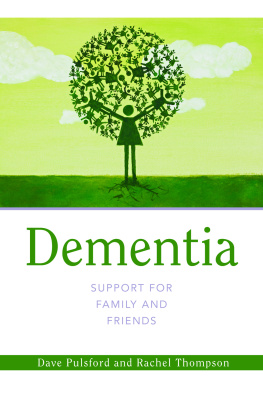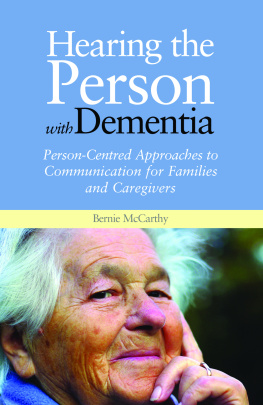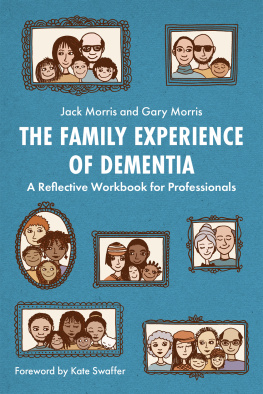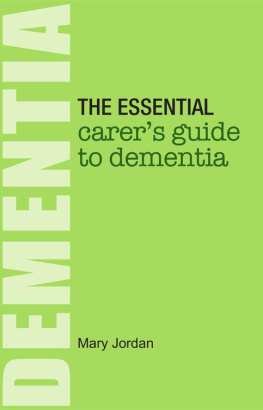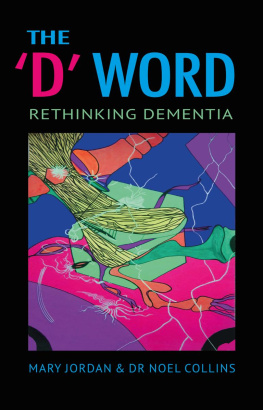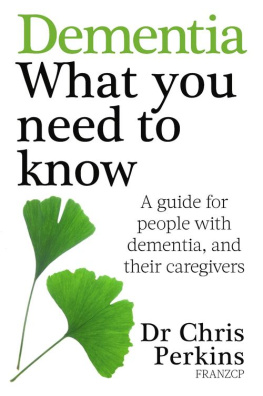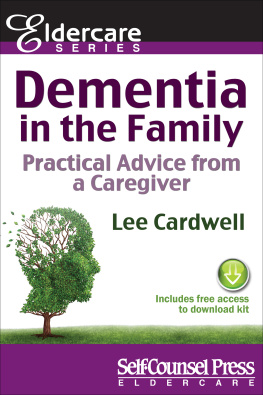
Dementia
SUPPORT FOR
FAMILY AND
FRIENDS
Support for Family and Friends
Series Editors: Joanne Kerr and Alison Welsby
When a family member or friend is chronically ill or has a life-altering condition, not knowing how best to help can make you feel helpless. However, there are simple things that you can do to help both the person affected and the main carer (if this isnt you). The Support for Family and Friends series has been created for this purpose: to help you help your loved ones.
Providing up-to-date information about the illness or condition, as well as enabling you to understand what your family member or friend is going through, each book offers a wide range of ideas and advice about how to help, what to say and what to do. A useful directory of support groups and sources of information is also included so that you can access the best resources out there. You will be left feeling well informed and empowered to help even if just to offer peace and quiet in the most welcome and appropriate way.
in the same series
Chronic Fatigue Syndrome/ME
Support for Family and Friends
Elizabeth Turp
ISBN 978 1 84905 141 5
eISBN 978 0 85700 347 8
of related interest
Hearing the Person with Dementia
Person-Centred Approaches to Communication for Families and Caregivers
Bernie McCarthy
ISBN 978 1 84905 186 6
eISBN 978 0 85700 499 4
The Simplicity of Dementia
A Guide for Family and Carers
Huub Buijssen
ISBN 978 1 84310 321 9
eISBN 978 1 84642 096 2
Telling Tales About Dementia
Experiences of Caring
Edited by Lucy Whitman
ISBN 978 1 84310 941 9
eISBN 978 0 85700 017 0
Dementia
SUPPORT FOR
FAMILY AND
FRIENDS
Dave Pulsford and Rachel Thompson

Jessica Kingsley Publishers
London and Philadelphia
First published in 2012
by Jessica Kingsley Publishers
116 Pentonville Road
London N1 9JB, UK
and
400 Market Street, Suite 400
Philadelphia, PA 19106, USA
www.jkp.com
Copyright Dave Pulsford and Rachel Thompson 2013
Illustrations copyright Geoff Brennan 2013
All rights reserved. No part of this publication may be reproduced in any material form (including photocopying or storing it in any medium by electronic means and whether or not transiently or incidentally to some other use of this publication) without the written permission of the copyright owner except in accordance with the provisions of the Copyright, Designs and Patents Act 1988 or under the terms of a licence issued by the Copyright Licensing Agency Ltd, Saffron House, 610 Kirby Street, London EC1N 8TS. Applications for the copyright owner's written permission to reproduce any part of this publication should be address to the publisher.
Warning: The doing of an unauthorized act in relation to a copyright work may result in both a civil claim for damages and criminal prosecution.
Library of Congress Cataloging in Publication Data
Pulsford, Dave.
Dementia : support for family and friends / Dave Pulsford and Rachel Thompson.
p. cm.
Includes bibliographical references and index.
ISBN 978-1-84905-243-6 (alk. paper)
1. Dementia--Patients--Care. 2. Dementia--Patients--Family relationships. I. Thompson, Rachel. II. Title.
RC521.P85 2012
362.196'83--dc23
2012016567
British Library Cataloguing in Publication Data
A CIP catalogue record for this book is available from the British Library
ISBN 978 1 84905 243 6
eISBN 978 0 85700 504 5
Acknowledgements
We would like to thank:
Maureen Evans, Kate Harwood, Barbara Pointor, Peter Watson and the other family members and friends of people with dementia who kindly agreed to be interviewed for this book.
Introduction
About This Book
This book is for anyone who wants to know more about dementia and how to support those who are affected by the condition. Our readers may be close family members of someone living with dementia: their husband, wife, child or grandchild. Perhaps you have taken on or are anticipating the role of main carer for the person. Alternatively you may be a close friend and want to support the person and their family. You may even have concerns about yourself. How are you feeling at this moment? We are guessing you may be feeling worried and uncertain. This is understandable; however, with guidance and support some of the fears associated with dementia can be reduced.
Whatever your relationship to the person, we hope you will find this book informative and practical in offering advice and suggestions as to how to make the life of someone with dementia as pleasant and fulfilled as possible, while also supporting yourselves and each other. Above all, we hope that we can assist you to take on a positive attitude towards living with dementia. For although being a family member or a friend of a person with dementia can be difficult, wearying and sometimes heart-breaking, with your help and that of others, including paid carers and professionals, the person can have a good quality of life and experience a sense of well-being right up to the end of their life. This means that you can take some comfort and satisfaction in knowing that you have done your best for the person and those close to them.
Dementia is a progressive and terminal condition for which there is as yet no cure. However, there is much that can be done to help people who have it. We assume in this book that our readers are committed to making life for a person with dementia the best it can be, but need knowledge, understanding and skills in order to do so. Important aspects of knowledge include information about the type of dementia the person has, how dementia will affect the person and others, and what sources of outside or professional support are available.
Understanding is needed of how people with dementia experience the condition; what their feelings are likely to be; and, importantly, how they experience the world through the cognitive difficulties that are the main feature of dementia. We call this dementia empathy and regard this quality as the most important factor in successfully supporting a person with dementia. We will discuss this concept in some depth throughout the book. Important skills include being able to communicate effectively with someone with dementia, helping the person keep active and independent, and responding effectively if the person behaves in ways that others may find difficult.
Also, the journey through dementia will include many decision-making points, where either the person themselves or those close to them must decide on future courses of action. We believe the information and ideas in this book will assist our readers with decision making and, where possible, encourage them to include the person with dementia in reaching decisions. The content derives from our experience as practitioners, teachers and researchers in the field of dementia care. We also bring in the voices of family members and friends of people with dementia by including quotes from interviewees who have very kindly offered their own experiences of caring for and supporting someone with dementia.
Dementia is a progressive condition that may take years to reach its conclusion. The person is likely to pass through broadly defined phases on their journey through dementia, although each person may have slightly different symptoms. These phases have been termed early (or mild), moderate, and advanced (or severe) dementia. We have adopted the approach of structuring this book to reflect the progressive nature of dementia and, although there will be some individual variations in how dementia progresses, we hope it offers a useful framework. We begin in . Specific issues will be discussed within the book at the point in the journey through dementia that they are most likely to arise, but it must always be remembered that people with dementia are all individuals and the condition may progress and affect people in different ways.
Next page
